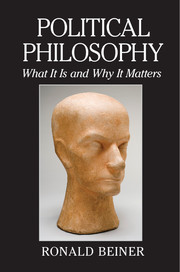Book contents
- Frontmatter
- Dedication
- Contents
- First Prologue: Horizons of Political Reflection
- Second Prologue: Freud, Weber, and Political Philosophy
- 1 Hannah Arendt: The Performativity of Politics
- 2 Michael Oakeshott: Life’s Adventure
- 3 Leo Strauss: The Politics of Philosophy
- 4 Karl Löwith: In Awe of the Cosmos
- 5 Excursus on Nature and History in the Strauss-Löwith Correspondence
- 6 Eric Voegelin: Modernity’s Vortex
- 7 Simone Weil: The Politics of the Soul
- 8 Hans-Georg Gadamer: Philosophy without Hubris
- 9 Jürgen Habermas: Politics as Rational Discourse
- 10 Michel Foucault’s Carceral Society
- 11 Alasdair MacIntyre: Fragmentation and Wholeness
- 12 Short Excursus on the Rise and Decline of Communitarianism as a Political Philosophy
- 13 John Rawls and the Death of Political Philosophy
- 14 Richard Rorty: Knocking Philosophy off Its Pedestal, or the Death of Political Philosophy Postmodernized
- Epilogue: On Not Throwing in the Towel
- Index
- References
14 - Richard Rorty: Knocking Philosophy off Its Pedestal, or the Death of Political Philosophy Postmodernized
Published online by Cambridge University Press: 05 August 2014
- Frontmatter
- Dedication
- Contents
- First Prologue: Horizons of Political Reflection
- Second Prologue: Freud, Weber, and Political Philosophy
- 1 Hannah Arendt: The Performativity of Politics
- 2 Michael Oakeshott: Life’s Adventure
- 3 Leo Strauss: The Politics of Philosophy
- 4 Karl Löwith: In Awe of the Cosmos
- 5 Excursus on Nature and History in the Strauss-Löwith Correspondence
- 6 Eric Voegelin: Modernity’s Vortex
- 7 Simone Weil: The Politics of the Soul
- 8 Hans-Georg Gadamer: Philosophy without Hubris
- 9 Jürgen Habermas: Politics as Rational Discourse
- 10 Michel Foucault’s Carceral Society
- 11 Alasdair MacIntyre: Fragmentation and Wholeness
- 12 Short Excursus on the Rise and Decline of Communitarianism as a Political Philosophy
- 13 John Rawls and the Death of Political Philosophy
- 14 Richard Rorty: Knocking Philosophy off Its Pedestal, or the Death of Political Philosophy Postmodernized
- Epilogue: On Not Throwing in the Towel
- Index
- References
Summary
As we saw in the previous chapter, John Rawls put on the agenda (tried out as an experiment, so to speak) the possibility of a mode of political philosophy that would dispense with appeal to the idea of truth, and, as we have seen elsewhere in this book, the same line of thinking was anticipated by other thinkers, such as Arendt and Foucault. But Richard Rorty went the furthest in putting this non-truth-based reconception of political philosophy at the center of his philosophizing. Hence, anyone concerned with the future of political philosophy as an intellectual discipline must confront Rorty, and, one hopes, repel his idea of detaching philosophy from truth. Rorty had a talent for forging syntheses among philosophical views that one would otherwise assume to be utterly incombinable: Dewey and Heidegger, Derrida and Rawls, and so on. The sense of paradox associated with some of these unlikely combinations helped a lot, I believe, to win Rorty a large readership, although he also should not go without credit for generating novel insights by means of this often bold mixing-and-matching. As regards political philosophy, what Rorty offers is an amalgam of Rawlsian and Shklarian liberalism, rendered distinctive via a postmodernish radicalization of Political Liberalism’s move away from the age-old notion that it is the job of political philosophy to articulate and defend truth-claims. There is nothing perceptibly postmodern about how this conception is presented by Rawls, but it becomes postmodern in the hands of Rorty. Rorty’s core agenda for political philosophy is captured well in the three banners that figure in the title of his book: irony, solidarity, and contingency. Each of these themes will figure to some extent in the discussion that follows, but it is chiefly the emphasis on irony that makes Rorty a postmodern liberal, rather than a liberal of the standard Rawlsian sort, and the coherence or incoherence of Rorty’s political philosophy will ultimately hang on whether an appeal to irony makes for a coherent version of liberalism (or any other political philosophy).
- Type
- Chapter
- Information
- Political PhilosophyWhat It Is and Why It Matters, pp. 215 - 228Publisher: Cambridge University PressPrint publication year: 2014



